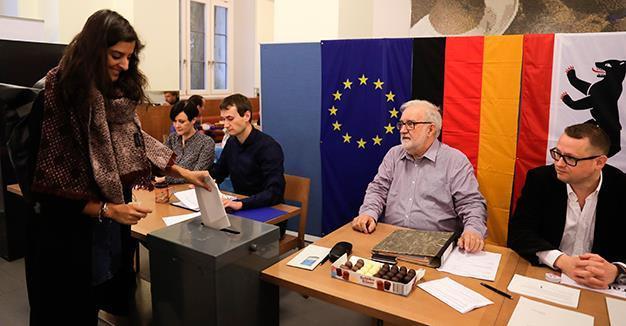Ankara’s eyes on new government in Berlin
ANKARA / BERLIN

AP photo
Germans voted on Sept. 24 in a general election expected to hand Chancellor Angela Merkel a fourth term, with Turkey hoping that the recent crisis between the two NATO allies will ease with the new government.
Europe’s most powerful woman appeared all but assured of winning another term, matching the 16-year reign of her mentor Helmut Kohl, while the hard-right nationalist Alternative for Germany (AfD) was expected to make history by winning its first seats in parliament.
Surveys suggest Merkel’s conservative Christian Democratic Union (CDU/CSU) alliance has a double-digit lead over its nearest rivals, the center-left Social Democratic Party (SPD) of Martin Schulz.
Home to some 3 million people of Turkish descent, Germany has traditionally had good relations with Turkey, which is also a major trade partner and tourist destination for German sun-seekers.
But German officials have been enraged by Turkey’s arrest of around a dozen German citizens, including the German-Turkish journalist Deniz Yücel, who has been held in jail for more than 200 days.
Ankara and Berlin have been at odds, particularly since the July 2016 coup attempt in Turkey. Relations became particularly tense after Merkel said she would support the end of Ankara’s membership talks with the European Union in late August.
President Recep Tayyip Erdoğan previously urged Turkish citizens in Germany not to vote for Merkel or other major parties in the country, calling them “enemies of Turkey.”
Turkey and Germany are also at odds over Berlin’s refusal to extradite asylum seekers Ankara accuses of being involved in the July 15, 2016, failed coup attempt, widely believed to have been masterminded by the followers of the U.S.-based preacher Fethullah Gülen.
Turkish officials argued that the election campaigns were a major cause of the rising tensions, voicing belief that the ties will normalize when the election is over.
“Criticism from Europe is about their internal politics,” Erdoğan said on Aug. 12.
“France and Austria did this before, we see that Germany follows the same strategy. I believe that this situation will improve after the elections,” he added.
A new party recently formed by ethnic-Turkish citizens was also running in the election.
The Alliance of German Democrats (AD-D) won 14,000 votes in May’s regional election in the northern state of North Rhine-Westphalia, and used Erdoğan’s call in its election campaign to woo Turkish-German votes, but was not expected to clear the threshold.
With four other parties predicted to clear the five-percent threshold to enter the Bundestag, the highest number since the 1950s, it could take months of coalition wrangling before the next government takes shape.
But mainstream parties have already ruled out talking to the anti-Islam, anti-immigration AfD, which is polling at 11 to 13 percent and could emerge as Germany’s third-strongest party.
Alarmed by the prospect of what Foreign Minister Sigmar Gabriel branded “real Nazis” entering the Bundestag for the first since World War II, politicians used their final days of campaigning to urge voters to reject the AfD.
“This Alternative for Germany is no alternative. They are a shame for our nation,” former European Parliament chief Schulz told a rally on Sept. 22.
Preliminary figures indicated that turnout was up compared to the 2013 election in major cities including Berlin, Munich and Hamburg.
Commentators say Merkel’s reassuring message of stability and prosperity has resonated in greying Germany, where more than half of the 61 million voters are aged 52 or older.
